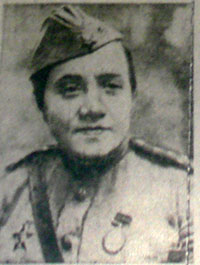Liuba Sheinina was born into a Jewish family in the town of Svisloch, Belarus in 1901. Prior to the war she worked as a surgeon at a hospital in Rostov-on-Don. On June 23, 1941, the day after the outbreak of war, Liuba Sheinina volunteered to join the Red Army. From September she served as a surgeon and head of the medical staff of the Infantry Division Field Hospital. Her only son - Mikhail (Misha), who was called up to the Red Army at the beginning of the war, served as a pilot and was killed apparently during a combat mission.
On February 21, 1942 Liuba Sheinina was awarded the medal for Combat Merit for her devotion as a military doctor and a surgeon. In May 1943 Captain Liuba Sheinina, then commander of the surgery-dressing platoon of the Medical-Sanitation Battalion of the Infantry Division, was awarded the Order of the Red Star.
An article "The Surgeon Liuba Sheinin," that was written by Shlomo Rabinovich for the Jewish Anti-Fascist Committee's newspaper Eynikayt and published there on September 16, 1943, describes Liuba's devotion and professionalism, for which she was awarded a further medal.
During the Red Army offensive in East Prussia (January-April 1945) Liuba Sheinina (then a commander and a surgeon of the surgery-dressing platoon of the Medical Sanitation Battalion No.128) successfully performed over 100 varied life-saving operations. The medical personnel under her command operated on or provided medical assistance to approximately 3,000 wounded Red Army soldiers and officers, thus attaining a low level of mortality among the casualties. During the course of the war 646 blood transfusions were carried out under the supervision of Sheinina. She herself donated about 7 liters of blood. For these achievements on May 23, 1945 she was awarded the Order of The Patriotic War, 1st class.
While serving as a military doctor and surgeon, Sheinina also managed to carry out scientific research. One of her studies was highly regarded by the prominent Soviet-Jewish scientist Lina Shtern, a biochemist and physiologist who had served as a member of the Women's and Jewish Anti-Fascist Committees since 1942 (and was the only one of those accused in the JAC trial who was not executed).
Article about Liuba Sheinina
The following is an excerpt from the article by Shlomo Rabinovich, prepared for Eynikayt. The article stresses Liuba Sheinina's Jewishness, along with her Soviet patriotism:
"It was a dark night. [A group of an] intelligence unit successfully crossed the Dnieper [to the German side]. Nikolai Prokhorov [the commanding officer] and another 5 brave soldiers reached the German trenches in order to capture alive … one [of the Germans soldiers]…. During the exchange of fire with the Germans … Nikolai Prokhorov was severely wounded.… Twenty three wounds were counted on his body by personnel of the Medical-Sanitation Battalion [where he was taken]. Thirteen fragments had penetrated deep into his body. He was lying close to death due to his [tremendous] loss of blood. All the doctors thought that Prokhorov would not survive. Only one, the surgeon Liuba Sheinina, took it upon herself to save the life of the Soviet hero Nikolai Prokhorov. She was assisted in this by a young Jewish surgeon, Tsvirina, and a nurse, Katia Sibiriakova. She [Sheinina] did not leave his side for several days. Liuba Sheinina did everything possible so that this Soviet officer would recover. Only when she was sure that his condition had improved did she agree to evacuate Prokhorov to a hospital in the rear. Now Nikolai Prokhorov writes from [a hospital in the city of] Tashkent: "I can convey to you the good news – I am alive!… I should thank all of you [i.e., the staff of the surgery battalion], my friends, for saving my life. I found out that Dr. Liuba Sheinina saved my life. I will never forget her for my whole life. May the Jewish people who gave the [Soviet] motherland and the Red Army such a wonderful person, be blessed…."
From: GARF 8114-1-418, copy YVA JM/26223, published in Shlomo Rabinovich, "Der khirurg Liube Sheinin" (The Surgeon Liuba Sheinina), Eynikayt, September 16, 1943.







